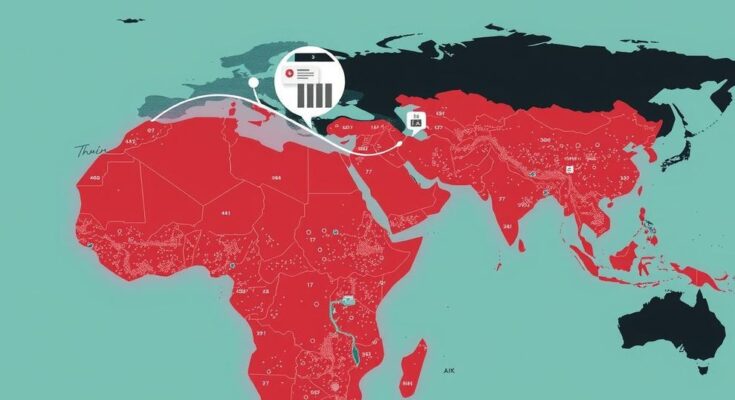The article discusses how social media exacerbates political confusion in South Sudan, emphasizing the need to avoid spreading false information. It highlights a recent incident involving Minister Lomuro and Radio Tamazuj amidst ongoing peace negotiations in Nairobi. The author warns that misinformation has historically led to violence and urges vigilance to promote peace and accountability.
Social media has proven to be a significant factor in perpetuating political confusion within South Sudan. It is crucial for South Sudanese with differing political viewpoints to refrain from disseminating false information via social media to foster peace. The recent exchange between Radio Tamazuj and Minister of Cabinet Affairs, Martin Lomuro, exemplifies how social media can escalate political tensions, further complicating efforts to reduce societal violence.
In the wake of the Tumaini peace negotiations commencing in Nairobi, unverified claims surfaced on social media suggesting that the leading mediator had expelled Minister Lomuro from the discussions due to his unfavorable stance on the peace process with unaligned groups. Although mediators lack the authority to expel governmental representatives from negotiations, these rumors were pressing enough to provoke a response from Lomuro. At a Nairobi press conference, he attributed the circulation of misleading reports regarding his supposed removal to Radio Tamazuj and opposing factions. However, Lomuro did not specify whether he had encountered these allegations through Radio Tamazuj.
This incident underscores three critical realities: firstly, the relationship between independent media outlets and government officials is strained; secondly, malicious individuals frequently exploit social media to obstruct peace initiatives; and thirdly, this scenario threatens to damage the rapport between media and political leaders in South Sudan.
While some may regard this exchange as trivial, the volatile political climate in South Sudan renders it a serious matter. Certain elements appear intent on sabotaging the ongoing peace process. It is imperative to confront these individuals and discredit the misinformation proliferated via social media to mitigate potential conflicts.
History shows that social media has been a conduit for turmoil in South Sudan. Misinformation has contributed to the loss of countless lives during the ongoing conflict. The disintegration of the initial peace accord in July 2016 serves as a stark reminder of the perils associated with misinformation. Clashes in Juba obliterated the peace agreement’s implementation, forcing all involved parties to renegotiate, resulting in today’s fragile revitalized peace agreement.
There exist conflicting narratives regarding what ignited the new wave of violence in July 2016. One account attributes responsibility to a false Facebook post purportedly spread by a spokesperson for Machar, alleging his detention by government forces, which, if true, escalated tensions and ignited violence. Machar’s spokesperson denied such accusations, yet doubt remained among many South Sudanese and the Kenyan government, leading to his deportation and subsequent detention.
Conversely, another narrative points to a deadly encounter at a security checkpoint as the trigger for the clashes. Regardless of the cause—be it a fabricated social media post or a security incident—malicious individuals were, and continue to be, a catalyst for violence, thwarting meaningful peace in South Sudan. Innocent civilians remain ensnared in the aftermath of such violence, highlighting the urgent need to curb the negligent use of social media that perpetuates conflict.
The current discord between Radio Tamazuj and Minister Lomuro could cultivate a toxic atmosphere during the ongoing negotiations in Nairobi. In any event, it is incumbent upon all parties to promote efforts aimed at peacefully resolving conflicts while circumventing the distractions posed by social media misinformation.
The original author of this opinion piece is a community organizer and Ph.D. candidate at McGill School of Religious Studies in Montreal, whose research emphasizes peacebuilding and social reconstruction within South Sudanese society.
The role of social media in South Sudan has been increasingly scrutinized due to its capacity to amplify misinformation and influence political narratives. The ongoing tensions and political dynamics have made it paramount for citizens to recognize the weight their online statements carry. This article addresses a specific incident highlighting the broader issue of media’s impact on peace processes and the tumultuous nature of political discourse in South Sudan.
In summary, the misuse of social media fuels confusion and violence in South Sudan, jeopardizing peace processes. The incident between Radio Tamazuj and Minister Lomuro illustrates the detrimental impact of misinformation spread across social platforms. It is vital for South Sudanese citizens to remain vigilant and accountable regarding the information they share. Strengthening the media-government relationship and prioritizing peace dialogue are essential for the country’s stability.
Original Source: www.radiotamazuj.org




